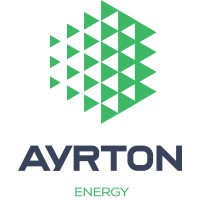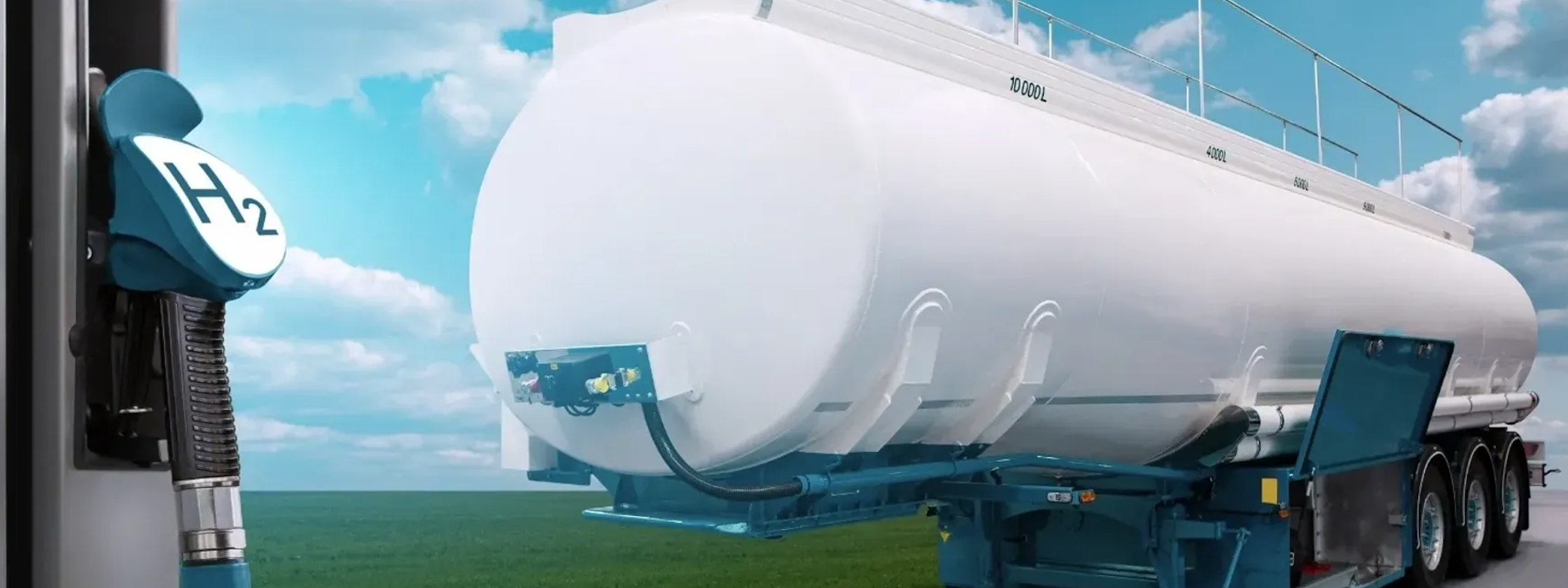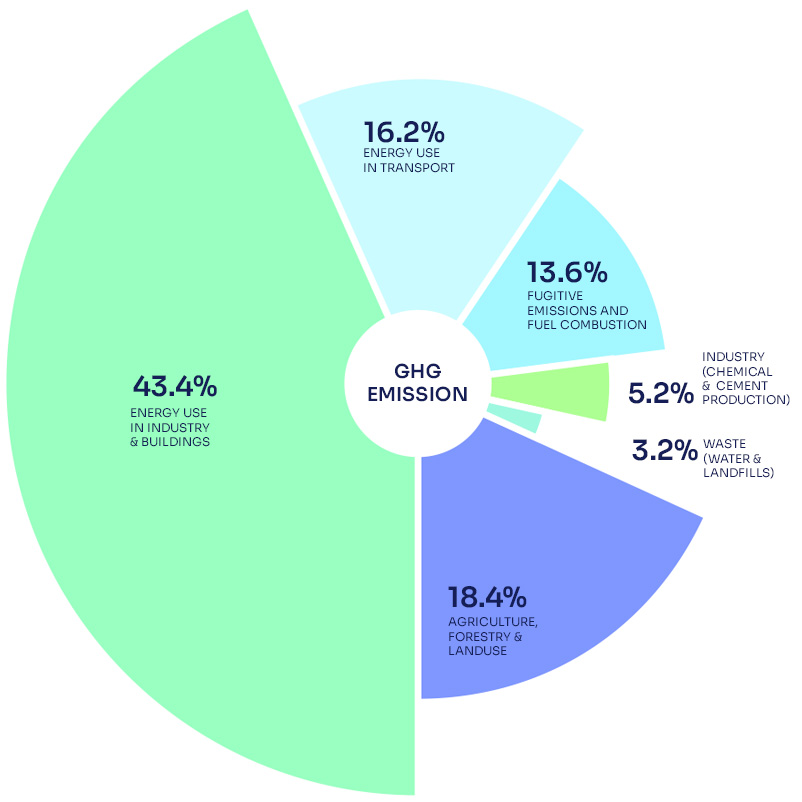February Week 2, 2025: Welcome to our ongoing blog series, where we spotlight the most promising climate tech startups. Each week, we feature five companies and add them to our running list of innovative companies driving solutions across sectors with the highest potential for greenhouse gas (GHG) reductions.
- Energy: How Do We Plug In? This sector represents one of the largest opportunities for GHG reduction. The shift to renewable energy sources, grid modernization, and improved energy storage solutions could reduce emissions by up to 420.60 GT. Startups focusing on grid modernization, energy storage, and decentralized energy solutions are making an impact in transforming how we generate, distribute, and consume electricity.
- Food, Agriculture, and Land Use: How Do We Eat and Grow Things? This sector holds the potential to mitigate between 226.50 and 312.00 GT of emissions. The challenges lie in addressing deforestation, improving soil health, and reducing food waste. Startups promoting regenerative agriculture, plant-based alternatives, and efficient land management practices can play a critical role in transforming food systems and restoring ecosystems.
- Industry: How Do We Build and “Circulate Things”? Industrial processes account for a significant portion of global emissions, with a potential reduction of up to 166.00 GT. The key challenge is decarbonizing heavy industries such as cement, steel, and chemicals. Startups that introduce cleaner production technologies, alternative materials, and carbon capture solutions can reduce emissions while supporting reindustrialization.
- Buildings: How We Live and Adapt? contribute heavily to emissions through energy consumption and construction practices, with potential reductions of up to 88.40 GT. The challenge is transitioning to energy-efficient buildings and sustainable materials while retrofitting existing infrastructure. Startups working on smart building technologies, insulation, and low-carbon materials can drive decarbonization in this sector.
- Transportation: How Do We Move Around? emissions could be reduced by up to 144.30 GT through the adoption of electric vehicles, improved public transit systems, and sustainable logistics. Key challenges include battery technology, charging infrastructure, and transitioning fleets. Startups innovating in mobility solutions, hydrogen fuel cells, and sustainable aviation can accelerate the sector’s decarbonization.
Each month, we add these startups to our running list, which we have categorized based on fuel emission sector data from Project Drawdown.
These sectors are as follows:
Why did we decide to focus on the five specific sectors?
These sectors present immense opportunities for innovation as well as addressing critical challenges related to GHG emissions. By narrowing our focus to these areas, we can better align our mission with impactful solutions and support founders who are driving meaningful change.
By spotlighting these startups, we aim to support founders by providing them with networking and exposure opportunities that can help them scale and finance their solutions.
Do not hesitate to join our collective movement by requesting your membership.
With care,
Guillaume and the SBC TEAM
Energy
Founded: 2021 – Calgary, CA
Founders: Natasha Kostenuk & Brandy Kinkead
Elevator Pitch: Ayrton Energy is revolutionizing hydrogen storage and transportation with its proprietary liquid organic hydrogen carrier (LOHC) technology. By enabling hydrogen to be stored and transported like gasoline, Ayrton is making clean hydrogen a viable alternative for power generation, off-grid energy security, and diesel generator replacement—accelerating the transition to a net-zero energy future.
Problem they solve: Hydrogen is a promising clean fuel, but its storage and transportation challenges—requiring high-pressure tanks or cryogenic conditions—have limited its widespread adoption. Industries and critical infrastructure rely heavily on diesel generators and lithium-ion batteries for backup power, both of which have environmental and supply chain limitations. Ayrton Energy solves this issue with a safe, efficient, and scalable way to store and transport hydrogen, making it a practical solution for energy security and grid resilience.
Impact: By replacing diesel generators and reducing dependence on lithium-ion batteries, Ayrton Energy’s hydrogen storage solution significantly lowers carbon emissions, air pollution, and resource-intensive battery production. Their technology enhances the viability of hydrogen as a clean energy source, reducing grid strain and supporting the transition to a sustainable, resilient energy ecosystem.
Stage: Seed.
Interested in Ayrton Energy?
To learn more about their technology or get in touch, see here.
Food, Agriculture & Land Use
Founded: 2023 – Louvain-la-Neuve, BE
Founder: Simon Caulier
Elevator Pitch: BiocSol is revolutionizing crop protection with innovative microbial-free biopesticides that offer farmers efficient and cost-effective biocontrol solutions. Emerging from UCLouvain’s research initiatives, BiocSol leverages specific microbial substances to develop reliable biosolutions that combat critical agricultural threats, such as mildew agents, ensuring healthier crops and sustainable farming practices.
Problem they solve: Traditional pesticides, while effective, pose significant environmental and health risks, including chemical residues, soil degradation, and resistance development in pests. Moreover, many existing biopesticides rely on live microbes, which can present storage and application challenges. BiocSol addresses these issues by developing microbial-free biopesticides, offering farmers reliable protection without the complications associated with live microbial agents or the harmful impacts of chemical pesticides.
Impact: BiocSol’s biopesticides promote sustainable agriculture by reducing the reliance on chemical pesticides that harm ecosystems, contaminate water sources, and contribute to biodiversity loss. Their microbial-free formulations minimize the risks of resistance development and ensure long-term crop protection with lower environmental footprints. By offering scalable, eco-friendly solutions, BiocSol supports greener farming practices and contributes to more resilient food systems.
Stage: Seed.
Interested in BiocSol?
If you are interested in learning more, see here.
Transportation
Founded: 2018 – Santa Clara, CA, USA
Founder: Tom Sun
Elevator Pitch: AmpUp is transforming electric vehicle (EV) charging with a robust network that simplifies the charging experience for drivers, hosts, and fleets. Through its advanced technology, AmpUp empowers businesses and property owners to manage multiple charging stations seamlessly, creating the world’s largest EV charging network that combines shared private and public chargers.
Problem they solve: As electric vehicle adoption grows, the lack of accessible, reliable, and easily managed charging infrastructure remains a critical barrier. Businesses, property owners, and fleet operators often face challenges in deploying and managing multiple charging stations efficiently. AmpUp addresses this by providing a scalable platform that allows real-time management of charging stations, ensuring optimal utilization, reduced downtime, and a superior charging experience for EV drivers.
Impact: AmpUp’s solution accelerates the transition to electric mobility, directly contributing to the reduction of greenhouse gas emissions by promoting EV adoption. By optimizing charging station management and increasing access through a shared network model, AmpUp reduces the need for fossil-fuel-powered transportation, supporting cleaner cities and a lower-carbon future. Their approach also minimizes infrastructure redundancy, promoting resource efficiency and sustainable energy use.
Stage: Series A.
Want to learn more about AmpUp?
To learn more about their technology or get in touch see here.
Energy
Founded: 2020 – Houston, TX, USA
Founder: Alex Ince-Cushman
Elevator Pitch: Branch Energy is revolutionizing home energy management by combining renewable energy with smart home technology and data analytics. More than just a renewable energy provider, Branch empowers customers to lower their energy bills and carbon footprint through intelligent, seamless energy management solutions that outperform traditional utilities.
Problem they solve: Traditional energy providers often fail to offer affordable, clean, and efficient energy solutions tailored to individual needs. Energy consumption remains inefficient, and customer experiences are outdated. Branch Energy addresses these issues by leveraging smart home technology and data analytics to optimize power consumption, reduce costs, and connect customers with renewable energy sources, all while delivering a superior customer experience.
Impact: By promoting intelligent energy management and reducing power consumption, Branch Energy directly lowers carbon emissions from household energy use. Their focus on supporting clean energy projects accelerates the transition to renewable energy, contributing to climate change mitigation. Additionally, optimized energy consumption through smart technology reduces overall energy demand, leading to more sustainable electricity grids and decreased reliance on fossil fuels.
Buildings
Founded: 2022 – Cambridge, UK
Founders: Poppy Brewer, Bill Yost & Cyrille Dunant
Elevator Pitch: Cambridge Electric Cement (CEC) is revolutionizing the cement industry with the world’s first low-carbon, recycled cement. By leveraging electric arc furnaces (EAFs) used in steel recycling, CEC co-recycles steel and cement, producing a circular cement product that matches the performance of traditional Portland cement without the associated carbon emissions. This scalable solution offers a sustainable alternative that integrates seamlessly into existing steelmaking infrastructure.
Problem they solve: The cement industry is responsible for approximately 8% of global CO2 emissions, primarily due to the energy-intensive kiln processes and CO2 released during limestone calcination. Simultaneously, construction and demolition waste, including old concrete, poses significant disposal challenges. CEC addresses these dual issues by reactivating recovered cement paste (RCP) from old concrete waste using EAFs. This process eliminates kiln-related emissions and reduces waste, offering a sustainable, circular solution for the construction sector.
Impact: CEC’s innovative process significantly reduces the carbon footprint of cement production by eliminating kiln-related energy consumption and calcination emissions. By repurposing existing steel recycling infrastructure, it also reduces the need for new manufacturing facilities, further minimizing environmental impact. The circular nature of CEC’s product ensures that construction waste is effectively transformed into high-performance cement, supporting a sustainable, low-carbon construction industry and contributing to global decarbonization efforts.
Stage: Seed.
Interested in Cambridge Electric Cement?
If you are interested in learning more, see here.
Do you know of other startups we should include in our Startups to Watch Series? Submit to our list!
How do these startups fit in with all the others we have looked at?
Check out our running list of the 400+ climate tech startups to watch we have featured.
















